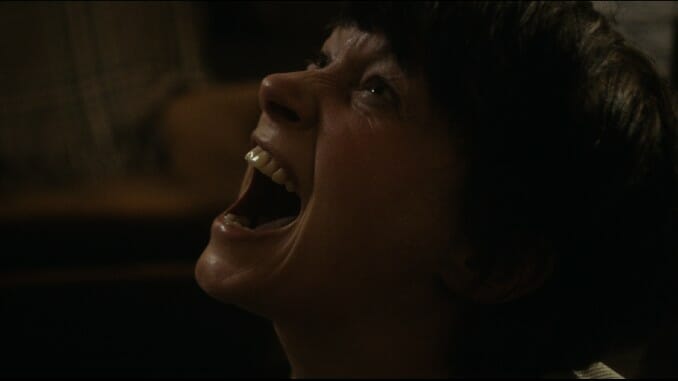You Are Not My Mother Can’t Sustain Its Flimsy Irish Folklore

A fraught mother-daughter dynamic fills every frame of director Kate Dolan’s debut feature You Are Not My Mother, even when half of the duo is physically absent from the screen. What begins as an anxiety-inducing study of what happens when parents can’t protect and nurture their own children descends into a half-baked domestic horror that keeps its most interesting musings at arm’s length. While no Irish horror film is required to exploit the country’s centuries-old Gaelic folklore for the purpose of slick, socially conscious entertainment, it feels just as inappropriate to insert this phenomena into a film only to ultimately leave it by the wayside. Sure, dysfunctional parents are just as horrifying as fae folk in their ability to unmoor a child from societal safety nets—but both observations are equally tiring if they’re simply playing into tired tropes and drab narrative conventions.
Suffering from the excruciating existence inherent to teenage girlhood, Char (Hazel Doupe) finds her existential condition compounded by that of her mother’s (Carolyn Bracken). On what should be an ordinary drop-off at school, Char frantically takes the wheel after her mother nearly collides with an ominous black stallion. Exasperated by her lack of regard for both of their lives, Char storms out of the car and arrives at school on foot. After enduring her daily dose of somewhat sexually-charged bullying at an all-girls school, Char embarks home, but stumbles upon a stomach-churning discovery. Her mother’s car is still parked haphazardly on the side of the road where it had swerved earlier, the driver’s side door open and the vehicle abandoned. Police are promptly notified, but they insist that there’s really not much to be done without more time passing. Char’s maternal grandmother (Ingrid Craigie) and uncle (Paul Reid) are distraught, but an air of familiarity around the issue further perturbs Char—that is, until her mother returns home in the dead of night, leaving the front door eerily ajar after her re-entry. While everyone should ostensibly be relieved, it seems that something sinister has changed within Char’s mother—an uncanny feeling aptly described by the film’s title. In her mother’s newfound warmth and devotion, there’s also a stark unfamiliarity. Perhaps an age-old entity might be behind this disquieting shift in personality?
You Are Not My Mother is an exercise in dealing with parents who are too far gone in their own mental issues to adequately support the struggles of their own children, yet this narrative device is both underexplored and overutilized. The film never establishes any tangible mental struggle for Char’s mother outside of prolonged sleep cycles and her weary mumbling of “I can’t do this anymore,” the achingly pessimistic phrase that causes Char to walk herself to school before her mother’s eventual disappearance. However, it’s clear from the film’s first moments that Char may have been victim to far more heinous parental crimes than being emotionally neglected due to regular bouts of depression. A bright red scar that streaks the side of her face alludes to a past rife with physical and emotional turmoil. Perhaps this is why Char remains cold toward her mother even with her improved behavior—sometimes, these acts of affection are simply too little too late. Yet, taking the time to navigate the nuances of this relationship would have raised the film’s stakes considerably, particularly when there’s not a whole lot of narrative meat to begin with.
-

-

-

-

-

-

-

-

-

-

-

-

-

-

-

-

-

-

-

-

-

-

-

-

-

-

-

-

-

-

-

-

-

-

-

-

-

-

-

-








































